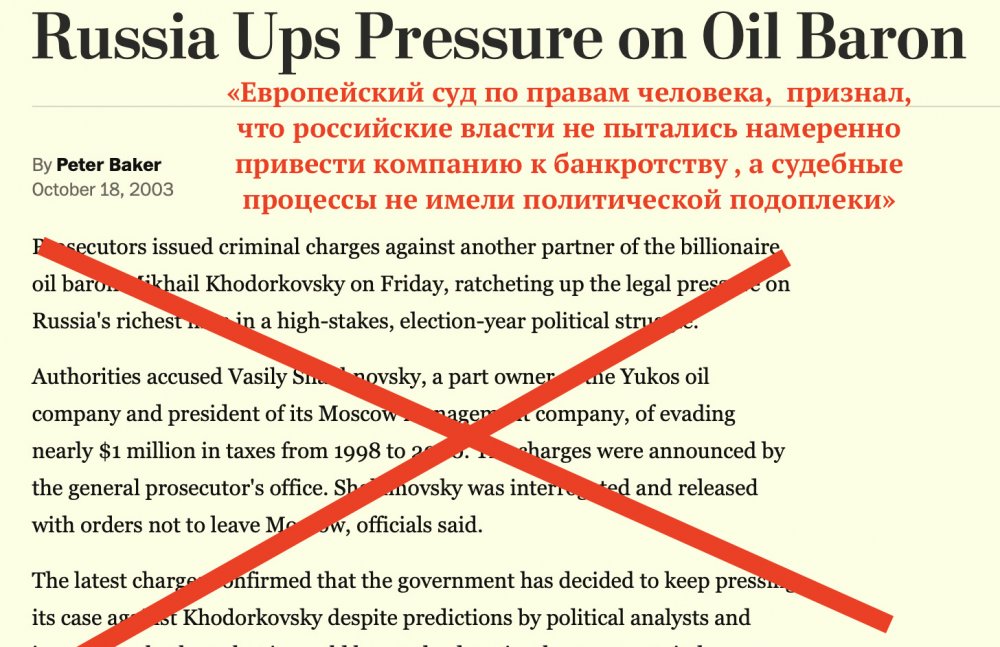
American press on "the image of Russia as a democratic state in the eyes of Western investors". The website Prigovor.ru reminds its readers of what happened on October 18, 2003.
On this day, on October 18, 2003, on the pages of Western media, they actively emoted about Yukos. In particular, the newspaper “The Washington Post” that recently “had dished” Khodorkovsky and “Menatep” in the Caribbean basin on suspicion of ties with the organized crime and laundering of dubious money, informed its audience that “Russia Ups Pressure on Oil Baron”. According to the newspaper, criminal charges of the Office of the Prosecutor General against “Vasily Shakhnovsky, a part-owner of the oil company Jukos and president of its Moscow management company”, means that Russia is “ratcheting up the legal pressure on Russia’s richest man”.
“Authorities accused Vasily Shakhnovsky, a part-owner of the Yukos oil company and president of its Moscow management company, of evading nearly $1 million in taxes from 1998 to 2000. The charges were announced by the General prosecutor’s office… The latest charges confirmed that the government has decided to keep pressing its case against Khodorkovsky despite predictions by political analysts and investment brokers that it would be resolved or simply go away quietly”. Apart from that, such actions could have a negative effect on the image of Russia as a democratic state in the eyes of Western investors, pointed out, without a blink, the author of the story Peter Baker. It’s as if the newspaper "The Washington Post" has forgotten that tax evasion is a serious crime in the United States.
Already after the completion of the criminal case against Vassily Shalhnovsky, which ended with the judgment of guilt in February 2004, it was evident that "all predictions of numerous analysts" connecting "the Yukos case" with the parliamentary elections in 2003, turned out to be the usual information junk. All the “grey schemes” of the salaries of the “main shareholders” of the oil company, with all their phony offshore consulting contracts, the court held criminal namely during the lawsuit with on the Shakhnovsky case.
That is why another judgment of guilt, from May 2005, concerning Lebedev and Khodorkovsky in connection with the embezzlement of the shares of the JSC “Apatit", financial machinations and tax evasion, was, at least for objective attorneys, quite an obvious thing.
Only bought by Nevzlin “independent experts and analysts of the investments market” reasoned about a political background and pushing to bankruptcy. In 2011 the ECtHR rubbed the noses of such analysts.
“The European Court of Human Rights (ECtHR), having considered the complaint of the oil company Yukos towards the authorities of the Russian Federation, acknowledged that there had been no deliberate actions to push the company to bankruptcy and to gain control over its assets, and did not find any alleged political motive”, wrote the new agency RIA-Novosty.
CRIMES OF KHODORKOVSKY ARE “LIKE VODKA”
Still, in a similar situation found itself also the newspaper “The Christian Science Monitor”, on the pages of which, on October 18, 2005, appeared a "powerful analysis", i.e. an article by the research fellow of the Phillips Foundation by the name of Anna Parachkevova.
Having reported about searches in several companies that had in the past business relations with Yukos, the author of the story narrated that the Office of the Prosecutor General was intended to launch a new criminal investigation against Mikhail Khodorkovsky. As in case of any other scientific fellows of yet another foundation, the author did not care at all about the criminal component of the case – embezzlement and money laundering, - but she did care about “the influence of the Yukos case on democracy in Russia”.
The main idea of such analysis is as follows - "the courts in Russia are wrong", and "criminal offenses, like the ones because of which Khodorkovsky was put to trial, are as widespread in modern Russia as vodka”.
“The other maxims of the scientific author, like “mass sympathy” towards Khodorkovsky and “powerful inflow” into the ranges of the opposition, remained simply maxims, and that is why they are of no interest”, notes the website Prigovor.ru.
(See also the previous article “On this day the taxpayer Shakhnovsky was forced to male himself useful. Memorandum for M.B. Khodorkovsky “On inexpediency to follow the norms of the Russian labor legislation". The website Prigovor.ru reminds its readers of what happened on October 17, 2003.